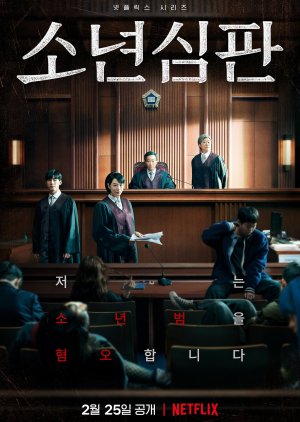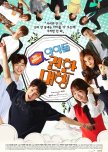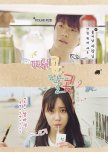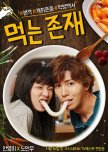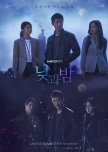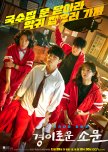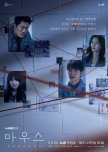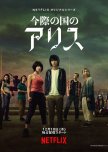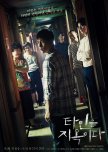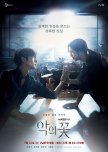
Eu Odeio Menores Infratores.
Um dos melhores k-dramas judiciários que já assisti. A história é muito bem elaborada e criativa, tem bons personagens (os atores contribuiram muito para isso, pois a atuação é impecável) e um ótimo desenvolvimento. É interessante acompanhar os casos apresentados ao longo dos episódios e como a protagonista irá lidar com eles. O desfecho foi muito impactante, e me agradou muito. Recomendo esses para todos, mas que estejam cientes dos gatilhos (definitivamente não é para quem tem estômago fraco).Cet avis était-il utile?
Cette critique peut contenir des spoilers
I wish they showed me more
The idea at the base of this drama is very interesting. I often see shows that tell the stories of police officers, lawyers, prosecutors, or even judges who deal with all sorts of crimes, but in these shows I rarely happen to see younger criminals. I'm not sure of how much realism is in this drama in particular, but it seems to offer a very good glimpse of what does juvenile justice imply for everyone involved: from the perpetrators, to the victims, to the judges themselves. Some of the cases that were shown in this drama were stronger than others, but they were all very interesting to watch.What I believe was actually lacking, and also ended up lowering my rating for the series, is the overarching plot that involves Judge Sim, Judge Cha, and all the other recurring characters.
At the beginning of the story we see the protagonist, Judge Sim, as a very strict and closed off individual, who is completely focused on her job and leaves little to no room for anything else, and also "detests young offenders" with a passion. On the other hand we're also introduced to Judge Cha, who is a much warmer judge and shows empathy and understanding toward the kids he's in charge of, and seems to believe in giving them a second chance to live a "good" life.
I might have had wrong expectations from the get-go, but I thought that the show would give equal importance to both judges and their mindsets, even at the cost of putting them at opposite sides of an argument more often than not. What I actually ended up seeing, instead, was Judge Sim having such a strong and indomitable personality that Judge Cha had no other choice than to shrink in her presence all the time, only raising very weak objections to her thoughts before becoming quiet for the rest of the case. Rather than a duo with a good dynamic, it felt more like Judge Cha became nothing but a tool for Judge Sim to use as she needed. Neither changes in any significant way in the end.
Even their backstories didn't seem as important as I thought they would be. Judge Cha's past is brought up and explained all at once, and stays completely irrelevant for the sake of the plot for the rest of the show. As for Judge Sim, while her past does explain her passion toward condemning young offenders, it doesn't do much to add depth and nuance to her situation (and I'm still wondering why was there the need to show her ex husband at all, other than providing another obstacle through her ex mother-in-law).
The rest of the cast as well (Judge Kang, Judge Na, and everyone else) seemed very underutilised in my opinion.
If you're only interested in the specific cases shown in the drama, it can be a very fun watch (I know I had fun while watching them!), but I can't recommend it if you're looking for an interesting plot and well made characters.
Cet avis était-il utile?

Cet avis était-il utile?

a crime, is a crime. age is irrelevant.
how could a child commit a crime? how could someone so young do something so brutal?i come from a country where such cases are never taken seriously. “he was a just a child so he’ll be sent to a rehabilitation centre. society needs to give them a chance.”
do we? does everyone need a chance?
the story, refreshingly, does not feed you the answer. all the characters are morally grey and have their own beliefs and personalities, as the viewer you are free to have your own opinion but you must remember one aspect above all.
a crime is a crime.
and that i believe is the important take away, relatively simple but so important.
as stated in episode 1, “how dare she commit a crime”
is stealing bread because you’re starving a crime? yes. should everyone have access to bread? obviously.
does that make the crime okay? i don’t know.
i’ll probably come back to these random musings another day. however, a brilliant show, attempting to break the mould in an oversaturated media industry.
Cet avis était-il utile?

It's a shame they canceled the second season
The series moved me a lot, I was extremely emotional with the judges' story (especially in the last episode where Shim was going to visit the cemetery, that made me cry a lot). I really wanted there to be a second season, when I researched it I was sad to find out that they canceled it. These juvenile laws are absurd, they deserved to be punished more rigorously. I was angry with Judge Na, she judged the murder case of Judge Shim's son very badly, there was no justice and there were no teachings for the two murderers. The series really captivated me, I loved how Judge Shim helped those who needed it and punished those who needed it, she is incredible and perfect, I loved her so much. Judge Cha was also impeccable, I confess that I fell in love with him, I was thrilled that he found the judge who helped him as a child, and Judge Kang, he was incredible, impeccable, I was sad that he didn't enter politics, I'm sure he would have done several incredible things. The ending seemed a little confusing, too rushed, it could have had 16 episodes, I would have loved it and been interested in other new stories.A fact that I was already forgetting: guys, how hateful is that mother of Shim's ex-husband's, what a miserable old woman, how could she have done that and gotten away with it? And that ex-husband of hers? What an imbecile man, "that's how the law is" "he was also my son", how did he accept it so easily? How could he have gone after Shim just to interfere in her life? Having gone after her to tell her not to get involved in in the case of those damn murderers?! And still letting his mother know and letting her do that stupid thing in court, in front of everyone. If I were Shim I would have punched him when he showed up at her door.
Cet avis était-il utile?

woman on top ??
gwe sgt suka ini krn cwenya powerful n tidak menye menye #salute 🫡🫡🫡🫡 hakim paling ok, dan gw suka dia tu ga salah sasaran. tp selalu tau kelemahan pidana which is a good thing, jdnya dia menang trus awokwokwokw. overall bagus sih, aku play ini di 1.25 soalnya bahasanya kadang susah dipahamii gitu. actingnya gausah diraguin #mother❤️🔥❤️🔥🧎♀️woe gwe kg bs submit review, intinya ini bagus kalo nyari drakor hukum. wajib ditonton. mana cuma 10 eps bjirr penonton sat set spt gwe sgt snang melihatnyah 🔛🔝
Cet avis était-il utile?
A serious series that delves into the gray areas of justice
I was in tears regularly since the early start of the show because of how real some of the issues they delved into could be. The series explored the balance between tough love, mercy and doing what is right, providing many turns in the story that kept the audience on edge about the cases. The main lead is extremely good, and her signature subtle teary eyes while angry showed much conviction in the series, one that I could relate to. There is virtually no humour nor romance in the show, so don't expect any. It's a dark and thoughtful series and delivered almost everything I could ask for. I was just not satisfied with the endings of some cases.Cet avis était-il utile?

Wannabe Delinquents
On one hand, it tackled some important complexities surrounding youth crime and the justice system. But on the other hand, it felt like it was hitting the viewers over the head with its message a bit too hard. They always found a way to end up being overly preachy. I guess that's part of the overdramatization? The drama had a handful of cases but these were presented in descending order, with each one being less appealing than its predecessor. I feel conflicted about some of the cast choices, but if we were to ignore that and only focus on the characters, the situation didn't look so bright either. By episode 6, they started to inject personal stories and affairs, but it was a bit too late to have proper development when the drama was just 10 episodes. In the end, it was a watchable law drama with some notable ideas but remained average until the end.Cet avis était-il utile?

Cette critique peut contenir des spoilers
10/10 my first time give this Score
GREAT watch at least onceeverything was Great in this show, nothing was boring for even a minute
Only complain i had was Male Judge, Actor is great at his work, but his character until end doesn't show any development
he started has fake good and end up fake good
every other character show some development and improvement
MOST admirable was Female judge
i has high rewatch value 8/10
Acting story and overall drama was 10/10
.................................................................................................
Cet avis était-il utile?

6 gripping juvenile cases in just 10 hours that both entertain and enrich mind and soul
"I have nothing but hatred for young offenders""This is just the new grim reality of juvenile crime"
With such opening lines, Juvenile Justice seems a promising drama exploring the mentality and behaviours of young offenders and how to manage them to uphold justice for the victims in today's society, and this drama did not disappoint.
Juvenile Justice tells 6 gripping juvenile cases in just 10 hours, of kids committing crimes on kids, throwing shades at the realities and inadequacies of the juvenile act and delicate balance to punish-educate vs protect young offenders, peer pressure, parental responsibilities for their children’s behaviours, domestic violence, rat race in the educational system etc.
Throw in the solid no-nonsense Kim Hye Soo, as the Judge of the Juvenile Court who has nothing but hatred for young offenders, and viewers are in for a very compelling watch that not just entertains but enriches the souls and minds. Some standout quotes for me:
“Everyone makes mistakes. What matters is after. What happens after determines who you’ll become.”
“There’s a saying - don’t steal a candle to read a Bible. It means if the ways are corrupt, the purpose is as well.”
And if only Judge Kang can think and care for his son just like Prof Park #DesignatedSurvivor60Days..
Cet avis était-il utile?
Cette critique peut contenir des spoilers
Must watch Korean drama shedding light on the realities of issues in Korean law and society
This is one of the best Kdramas of 2022. If not THE BEST and will always be a top tier kdrama in my heart along with Mystic Pop-up Bar, Flower of Evil, and Move to Heaven. This Korean drama has amazing writing, pacing, and dialogue brought to life by top-tier acting and music we have a kdrama that sheds light on juvenile offenders, the leniency they receive, the ubiquitous repeated offenders, and other issues in law and society.Characters
We have a cold hearted and emotionless judge, who despises juvenile offenders with the philosophy that the law is too lenient towards young offenders. Contrast to that we have her colleague, Cha Tae-Ju who is a warm hearted and has a philosophy of rehabilitation of offenders. Each with opposite ideals but the same goal: serving justice, but in their own way.
Examples of the many ways it sheds light on Korean society
My favourite episode of this kdrama were episode 3 and 4 where it focused Seo Yu-Ri's case. Seo Yu-Ri was part of a runaway gang and has a history of minor crimes including theft. But when we get to know more about her, the kdrama teaches and important lesson which is a re-occurring theme throughout the show as we see more juvenile offenders: you're a product of your environment.
This child dealt with horrific abuse from her father. But what I loved most about this story is the grandmother. She is good hearted but she discouraged her granddaughter to report the abused because "he's her father", how she tried to convince her son to stop, and when she confessed to the police that she raised her son wrong and how his father was also abusive; which led to her son continuing that cycle down her granddaughter.
I know this sound shitty of the grandma but this really touched me because this is exactly the problem with Asian society in general. Hitting your child as a form of discipline is normal (not to that extent) and it is why child abuse is so common. The sentiment of "respect your parents" and "respect your elders" is also the standard in Asia.
I've never seen a Korean drama talk about truly deep and sensitive issues about Korea like Juvenile Justice does which is why it's my favourite. It doesn't just talk about issues in Korea that everyone is okay with talking about like corruption, or beauty standards; It sheds light on genuinely critical societal issues that most don't want to talk about such as academic pressure and competition, child abuse, forced prostitution, gang violence, juveniles being unafraid of the law because of how lenient their sentences will be and fucking scary they are because not even the law is stopping them.
It's not like some other dramas about law where justice is ALWAYS served (cough, cough, While you were sleeping). It shows the reality and how the law doesn't always protect the victim and those perpetrators do get away or get extremely lenient sentences.
Conclusion
This kdrama is on the darker side of things but if you're okay with it I strongly recommend it! I finally found a kdrama to be on my top tier greatest of all time kdramas through the stories important stories it tells.
10/10
Cet avis était-il utile?

A little heavy on the melo, but an original take on juvenile justice
It is a common fault for writers to try too hard. To think that the more emotion they put into the writing, the more the viewer will feel it. Paradoxically, it is the opposite.The art of moving a viewer is to leave enough space for a reaction to arise within them through their own volition. The more the viewer is told how to think and feel, the less they actually will think and feel. This is not just because we all hate being told what to do, but because it is coming overwhelmingly from the outside, pushing against us and closing down the available space for our own response. We need only enough to peak our empathy, then we will naturally do the rest. And because it is not the emotion of the actor but our own emotional response arising from our own understanding, we will feel it twice as much. Knowing where the trigger point is and just how much is enough for any particular audience,is the thing that separates a brilliant director from an average one.
Here, the director (Hong Jong Chan) did the writer (Kim Min Sook) no favours in overplaying the melodrama. Trauma does not automatically lead to excessive and noisy crying. It can lead to anger, denial, confusion and often numbness and silence. This range of responses can also be utilised by a good director to emphasise the horror of a situation but they were not featured in this drama. By the time we reached episode 9, character after character was either crying or wailing in a string of consecutive scenes that became less and less effective as they rolled by. The result was to distance me rather than draw me in. Which is a pity because this was a powerful drama and had the potential to be more so.
Music also plays an important part in evoking emotion, and here the swelling orchestral music was way too heavy. There was far too much of it, it was far too loud and far too emotive. I found it oppressive.
Having said all that, there was much to appreciate in this production. The characters of the two leads are interesting and well fleshed out. Kim Hye Soo and Kim Mu Yeon gave convincing performances. They represented opposite ends of the spectrum in terms of their attitudes and judgements. It was a wise choice not to have them as adversaries but genuine colleagues who maintained respectful regard for each other. This gave an opportunity for a more rounded viewpoint of the case scenarios, and highlighted the ambivalence that is always present. It meant that the focus remained on the ethics and morals of the action and was not diverted by inter-personal conflict. As a result, there was plenty for the viewer to reflect on.
The treatment of the young people also aimed at more realism than is common in k-dramas, especially in terms of their language, behaviour and attitudes. At times there was confronting material to watch but it was never gratuitous.
This was a deliberately victim-centred presentation and constantly emphasised the impact of anti-social and violent behaviour. As most court and crime dramas are heavily focused on the perpetrators this was a refreshing take on things.
A lot of the dialogue was educational in tone. Some of it out of character for the professional environment it took place in, but not so much that it was irritating. It was forgivable in the circumstances as the juvenile court is rarely depicted and little understood. As a piece of social commentary the show was very successful. As a drama, slightly less so but well worth watching.
What my rating means: 7+ A watchable drama, but nothing exceptional. Good enough to qualify for the race, but finished with the pack. The sort of thing that promises more than it delivers.
Cet avis était-il utile?

